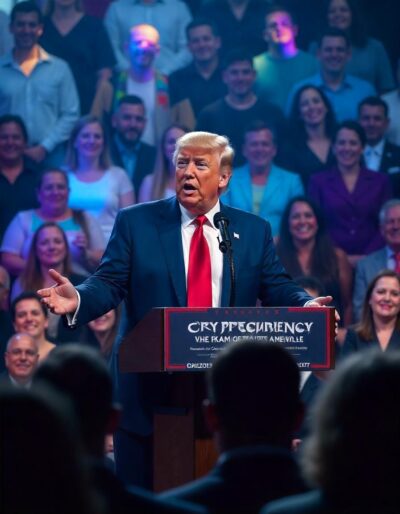
U.S. crypto News: This has been a year like no other for the crypto scene in the U.S., where stakes have gone high with regulators slapping massive fines on crypto firms, and some legal battles-like that of Ripple’s against the SEC-raise many questions about the future of crypto regulation in the nation. With over $19 billion in fines imposed to date this year, U.S. regulators are sending a very emphatic message, and companies seem to be feeling the heat.
The landscape gets even more complicated with the forthcoming presidential election in which the crypto industry hopes to get some much-needed clarity and support. With the political and regulatory pressure mounting, the U.S. crypto industry is standing at a fork in the road-one that would define its future for years to come.
Crypto Regulations in 2024: A Year of Record Fines
The crypto sector has been in the line of fire this year from US regulators, reaping in a record $19 billion in fines against mainstays such as FTX and Terraform Labs. Take for instance the fact that even the CFTC alone was able to harvest an astonishing $12.7 billion due to the big collapse of FTX for generally poor compliance and fraud.
These fines send a clear message: U.S. regulators are serious about bringing stricter control to the crypto world. But these settlements do more than just drain company coffers; they are to enforce anti-money laundering standards and protect the consumer.
The catch is, some experts are worried that heavy-handed regulations might even backfire, slowing down innovation while pushing crypto businesses overseas to lighter regulations. Perhaps what’s needed is a balanced approach to retain crypto talent, attract investment, and shield investors and the greater public in the United States.
Ripple vs. the SEC: A Defining Moment for Crypto’s Legal Future
Perhaps most importantly, the ongoing case of Ripple Labs against the U.S. Securities and Exchange Commission (SEC) probably has been one of the highest-stakes cases in the crypto world this year. With the SEC having appealed a 2023 ruling that favored Ripple on the grounds of sales of the cryptocurrency XRP not being considered securities, this ruling might shape the regulatory landscape of the industry for years.
Ripple further argues that XRP is a commodity and hence akin to Bitcoin-for that matter, it would be beyond the purview of the SEC.
The decision in favor of Ripple will open the floodgates for other crypto companies to challenge the SEC on its classification, while a loss will invite even more stringent regulatory standards across the board. Early 2025 is when a decision should be expected, and this case has been something of a focal point for industry participants and crypto enthusiasts alike, perhaps to decide how the future will look for the United States in both defining and regulating digital assets.
2024 Presidential Election: What is the future of Crypto?
The 2024 election seems pretty big for crypto, with some candidates touting a more relaxed, crypto-friendly approach and others opting to keep things status quo-that is to say, stricter. Some examples: Former President Donald Trump is said to favor lighter crypto regulations that would extend into the SEC during his term. Many believe that this could mean more crypto innovation and investments flow into the United States if he were to win.
In turn, if Biden wins again, then it is likely that we will see the same vigor in enforcement, with the SEC continuing to police the crypto industry strenuously. More consistency might be less surprising, but it probably maintains regulatory pressures on crypto firms at current levels.
Ripple‘s CEO, Brad Garlinghouse, has been preaching the need for regulators in positions of power who understand the crypto space. He has time and again reasoned that should the government not support the industry, it would translate to the U.S. losing out on being a global leader in digital assets. This leaves the country behind in innovation and growth at home. This election might determine the way forward for crypto in the US for the next several years.
Market Impact: How Rising Treasury Yields and Regulatory Uncertainty Are Fueling Volatility
The crypto market has been highly volatile this year due to an increase in US Treasury yield, regulatory actions, and investors being conservative. Higher yields have shifted some investors into more stable assets, lowering demand for crypto and reducing token valuations across the board. For example, XRP has seen price swings based on the ups and downs in Ripple’s legal questions, and Bitcoin and Ethereum have also seen ups and downs based on broader market pressure.
Considering that fact, investors are eyeing any possible indication of a policy about-face. A few analysts even say that in case of a victory from Trump or some other crypto-friendly candidate, there might be a relaxation of regulations, enhancing investor confidence in the sector. On the other hand, sustained regulatory pressure may make crypto values slump because institutional investors would continue to look elsewhere for more predictable returns.
What’s Next for U.S. Crypto Regulation?
This is now a pivotal moment in 2025 for the crypto industry in the United States. If what finally comes out of the Ripple case is some kind of clear classification, and then political change brings in a more crypto-friendly administration, then a progressive framework will be put in place that balances consumer protection with industry innovation. On the other hand, allowing regulatory pressure to build, may see talent and investment migrate to more hospitable jurisdictions.
The future of the industry now rests on a knife edge, as ongoing enforcement, jurisprudence, and political processes present a delicate balancing act of regulatory and market responses. Whether the US sustains its position as a home for blockchain innovation or relinquishes it to more hospitable jurisdictions overseas is what this will determine.
Conclusion: Balancing Innovation and Regulation for a Sustainable Future
In 2024, the crypto industry in the United States stands at a crossroads where regulatory scrutiny and political uncertainty are unprecedented. Indeed, huge changes will most probably happen within the next months; Ripple’s landmark case, new enforcement actions, and a political pendulum swing favorable to cryptocurrency. Innovation must be balanced with transparency and consumer protection.
This gives the U.S. the unparalleled opportunity to set a standard for crypto regulation around the world to drive growth while maintaining financial stability. Until a Ripple ruling and election outcome have been announced, that path will define whether the US leads or lags in the crypto revolution.





